
| ||||
|---|---|---|---|---|
 |
 |
 |
 |
 |



























| ||||
|---|---|---|---|---|
 |
 |
 |
 |
 |


























Piper PA-24-260 Comanche 260
Single-engine (260 hp) four-seat low-wing cabin monoplane
Archive Photos 1
Piper PA-24-260 Comanche 260 (N8828P, s/n 24-4284, 1965) on display at the 2009 Cable Air Show, Cable Airport, Upland, California (Photos by John Shupek)

Overview 2
The prototype Comanche first flew on 24 May 1956, and the first production aircraft on 21 October 1957. A total of 3,938 had been produced in four versions, with engines of different powers, by 1 January 1965.
The original Comanche had a 180 hp Lycoming engine. The second version, the Comanche 250 with a 250 hp Lycoming engine, received FAA type approval on 7 March 1958. During 1965 the available versions were as follows:
PA-24-260 Comanche 260
Basic model of Comanche 260 which was announced on 28 August 1964, as a replacement for the Comanche 250. Powered by 260 hp Lycoming O-540 or IO-540 engine. Normal fuel capacity 60 US gallons (227 liters), with optional extra 30 US gallons (113.5 liters). Introduced cleaned-up landing gear, with single-fork main legs, which create less drag when retracted. Improved cabin soundproofing, heating and ventilation.
PA-24-260 Comanche 260 Custom 93
Same as standard Comanche 260, with addition of vacuum system, full blind-flying instrumentation, Narco Mk 12 90-channel VHF transceiver with separate 100-channel nav receiver, Narco VOA-6 VOR converter indicator, Bendix ADF-T12, headset, microphone and radio selector panel, Piper TruSpeed Indicator in place of standard ASI, rotating beacon, heated pitot tube, 30 US gallon (113.5 liter) auxiliary fuel tanks.
PA-24-260 Comanche 260 Custom 103
Same as Custom 93, with addition of Piper AutoControl II and V0A-4 VOR/ILS localizer converter instead of the VOA-6.
PA-24-260 Comanche 260 Custom 113
Same as Custom 113, with the addition of Piper Course Selector DG to replace zero heading DG.
PA-24-260 Comanche 260 Custom 123
Same as Custom 113, but with Piper AltiMatic II in place of AutoControl II, plus automatic electric trim, which converts to manual electric tram went AltiMatic II is disengaged.
PA-24-260 Comanche 260 Executive 203
Same as Custom 103, with the addition of Narco Mk 12 360-channel transceiver, second Narco VOA-4 VOR/ILS localizer converter indicator, Piper PM-1 marker beacon, glare ban instrumentation lights and Piper manual electric trim.
PA-24-260 Comanche 260 Executive 213
Same as Executive 203, but with Piper Course Selector DG instead of zero heading DG.
PA-24-260 Comanche 260 Executive 223
Same as Executive 213, but with AltiMatic II automatic electric pitch trim replacing AutoControl II.
PA-24-260 Comanche 260 Sportsman 303
Same as Executive 203, plus Palm Beach interior with leather upholstery, two front seat headrests and rear seat pillow, curtains, and Palm Beach exterior.
PA-24-260 Comanche 260 Sportsman 313
Same as Sportsman 303, but with Piper Course Selector DG instead of zero heading DG.
PA-24-260 Comanche 260 Sportsman 323
Same as Sportsman 313, but with Piper AltiMatic II with automatic electric pitch trim replacing AutoControl II.
PA-24-260 Comanche 260 Professional 403
Same as a Sportsman 303, but with two Narco Mk 12 360-channel transceivers, one Narco VOA-4 VOR/ILS localizer converter indicator, one Narco VOA-5 VOR/ILS localizer converter indicator with glide-scope indication, Narco UGR-1A glide-slope receiver, Narco UDI-3 DME/GSI, Piper external power unit and anti-static antennae.
PA-24-260 Comanche 260 Professional 413
Same as Professional 403, but with new production Piper 3-in gyros in place of re-manufactured 5-in gyros, radio coupling to Omni and Piper course selector DG.
PA-24-260 Comanche 260 Professional 423
Same as Professional 413, but with Piper AltiMatic II replacing AutoControl II.
The following details refer to the basic PA-24-260 Standard Comanche 260, but are generally applicable to the other versions except for the detailed changes listed above.
Specifications and Performance Data (PA-24-260) 2
Type
Wings
Fuselage
Tail Unit
Landing Gear
Power Plant
Accommodation
Electronics and Equipment
Dimensions, External
Areas
Weights
Loadings
Performance at Maximum Takeoff Weight
References